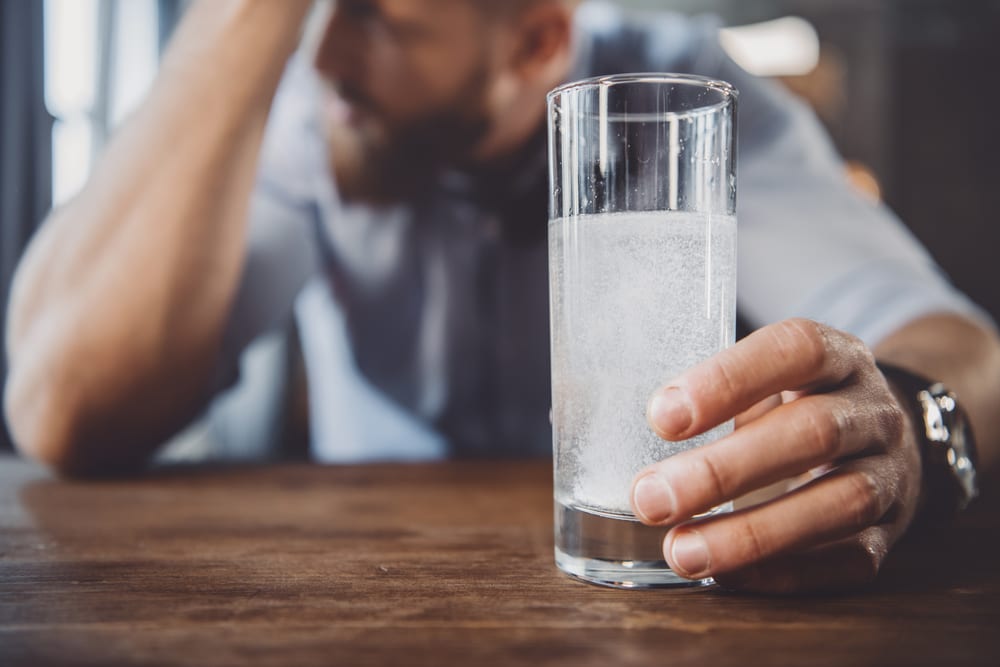
Features
Why do some people get worse hangovers than others?
5 years ago

By Katie Wright
Experts reveal the reasons some people are more prone to the after-effects of alcohol and get worse hangovers than others.
Recently, a friend uttered a statement that made me gasp in belief.
“I quite like being hungover,” she said. We were walking round a park and I was feeling the effects of one too many glasses of wine the night before. I was definitely not enjoying being hungover that day. In fact, I never enjoy being hungover.
Why is it, I wondered, that some people can knock back endless pints and still only get the kind of mild, sleepy hangovers that can be easily alleviated with junk food and trash TV, while others – myself included – suffer debilitating headaches and nausea after just a few vinos?
It’s a question that many people will be pondering as the reopening of pubs, bars and restaurants leads to an increase in sore heads and upset stomachs. In a bid to get to the bottom of this age-old quandry, I asked experts to explain the factors that influence hangover severity.
Drinking behaviours
“Drinking behaviours is the obvious starting point when it comes to why some people get a hangover, versus others,” says Dr Sanjay Mehta, GP at the London General Practice. “People who drink on an empty stomach, drink when they’re very poorly hydrated, drink with other drugs – like nicotine, for example – or drink when they’re on medication that can impact the way alcohol is broken down.”
Want to prevent a hangover? Dr Ross Perry, GP at Cosmedics, says: “Those who drink more water between drinks – and indeed before bed – should suffer less, as their body should be more hydrated.”
What you drink
Darker drinks tend to lead to a worse hangover than lighter liquids, because “they’ve got certain chemicals that lighter drinks don’t have, so an example of that would be things like red wine, or rum or whiskey,” says Dr Mehta.
“If you’re going to pick an alcohol, then I would avoid some of the alcopops and that sort of thing which contain slightly less pure components. They can sometimes contribute as well.”
Sleep
“The concept of hangovers getting worse the older you get, is a bit of a myth,” says Dr Perry. “Indeed, the amount of uninterrupted sleep can play a part in the intensity of hangovers, and it can certainly be true that you don’t sleep as well the older you get, so that could play a part.”
Dr Mehta adds: “Some people have poor sleep anyway, and they can sometimes be predisposed to hangovers, because alcohol impacts on your sleep.”
Age
Dr Mehta believes that age does play a part in terms of hangovers: “It’s not the most significant, but it is certainly a factor, for two reasons.
“One, your liver is less effective as you get older. The other aspect is that there is a marginal decrease in your body water composition as you get older as well, [meaning the alcohol] becomes more concentrated.”
Weight
“It’s a very obvious one that often heavier built individuals will be able to tolerate a hangover more than lighter built people,” says Dr Mehta.
“Again, it’s multifactorial, but if you were to take an individual who loses weight, actually there is evidence suggesting that same individual will experience hangovers more than when they were heavier.”
Physiology
Even people who are the same height and weight may experience the after-effects of alcohol differently, due to their physiological make up.
“Some people will digest things more slowly, and probably will be more sensitive as well to alcohol,” says Dr Mehta. “As a result, you’re ending up with the by-products of alcohol that give you that hangover in your system for longer, and a more sustained exposure.”
Genetics
“There is definitely a genetic component,” says Dr Mehta. “The big one that we all know about is the enzyme that is deficient in certain ethnic groups.”
Some people from Asian backgrounds have an inherited deficiency of aldehyde dehydrogenase, one of the enzymes involved in the breakdown of alcohol.
“They end up with this very prolonged and high level of the spike of the by-products that others may not necessarily get, and they get these classic symptoms of flushing and palpitations.”
Health conditions
How healthy you are at any given time can affect your tolerance, which is one of the many reasons it’s wise to ensure you have a nutritious diet.
“Those who are depleted in vitamin B or vitamin D can sometimes end up with more severe hangover symptoms,” Dr Mehta says.
Mental health
Plagued by the dreaded ‘hangxiety’ the morning after the night before?
“Individuals who suffer from anxiety may indeed feel worse [due to] hangover-related anxiety, and for some, it can cause them to feel flat, moody, panicked and, in extreme cases, crippling anxiety,” says Dr Perry. “This would lead to an anxious, nervous outlook, often making the hangover feel worse mentally.”
Dr Mehta says that psychological symptoms can worsen as you get older: “We know that people get a post-alcohol anxiety and some people get post-alcohol blues. If your hangover is worse due to age – which physiologically, it could be – then actually, those manifestations would be worse as well.”









 Subscribe
Subscribe Follow Us
Follow Us Follow Us
Follow Us Follow Us
Follow Us Follow Us
Follow Us Follow Us
Follow Us











